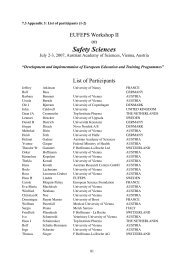2011 Anniversary Yearbook - EUFEPS today and history
2011 Anniversary Yearbook - EUFEPS today and history
2011 Anniversary Yearbook - EUFEPS today and history
Create successful ePaper yourself
Turn your PDF publications into a flip-book with our unique Google optimized e-Paper software.
It is also noteworthy that learned societies,<br />
with their independent scientific <strong>and</strong> social<br />
commitment, represent a ‘third force’ not<br />
yet exploited <strong>and</strong> willing to act. Thus<br />
learned societies should be involved in the<br />
development of the European Technology<br />
Platform, not least because universities at<br />
present are poorly organised in terms of<br />
drug development <strong>and</strong> sometimes hesitate<br />
to leave their ‘ivory towers’. On the other<br />
h<strong>and</strong>, the pharmaceutical industry is<br />
driven by economic requirements, acts<br />
globally <strong>and</strong> cannot be made responsible<br />
for sustainable development in a specific<br />
area. Learned societies represent science<br />
as a whole, as well as fields or subfields<br />
of scientific disciplines. The membership<br />
structures differ; they can have elected<br />
membership, require qualification in<br />
specific career sectors or be open to all.<br />
Geographical organisation can be local,<br />
regional, national, international <strong>and</strong> even<br />
global.<br />
The European learned societies<br />
exist for most disciplines of drug R&D.<br />
They organise researchers in terms of<br />
disciplines, house academic, industry<br />
<strong>and</strong> regulatory body scientists, <strong>and</strong><br />
they provide an effective infrastructure<br />
for their membership. They take rapid<br />
initiatives <strong>and</strong> move quickly. Money<br />
allocated to them would increase their<br />
output immediately.<br />
Contributions of learned societies<br />
to the European Technology<br />
Platform<br />
Learned societies could spearhead<br />
the European Technology Platform<br />
for Innovative Medicines. They could<br />
help harmonise research in different<br />
phases <strong>and</strong> fields of drug discovery <strong>and</strong><br />
development, <strong>and</strong> identify emerging topics<br />
<strong>and</strong> new techniques for drug discovery,<br />
development <strong>and</strong> evaluation early on.<br />
Provided they organise them selves<br />
into a drug discovery <strong>and</strong> development<br />
functional network (Pharmaceutical<br />
Sciences Forum), they can play a pivotal<br />
role in organising training <strong>and</strong> education<br />
as they house every required expertise.<br />
Learned societies could also help<br />
transfer promising science-related<br />
activities from the local to the regional/<br />
European level, <strong>and</strong> promote the common<br />
scientific <strong>and</strong> educational programmes<br />
of European universities. They would be<br />
able to support intra-European mobility<br />
<strong>and</strong> the exchange of researchers <strong>and</strong><br />
professionals by building a European post<br />
doc market. Vertical (local to European)<br />
<strong>and</strong> horizontal (different disciplines)<br />
integration would emerge.<br />
Challenges to learned societies<br />
One challenge is that lectures, symposia<br />
<strong>and</strong> training courses are becoming<br />
increasingly commercialised, frequently<br />
competing with the traditional activities of<br />
learned societies. This is because learned<br />
societies are dependent on a money flow<br />
between industry, academia, journals<br />
<strong>and</strong> courses. Dominating private vendors<br />
would drain this money flow.<br />
While using new media (Internet, data<br />
bases) helps learned societies, it can result<br />
in information ‘overload’, if not h<strong>and</strong>led<br />
correctly.<br />
However, the greatest threat to<br />
learned societies is that they will become<br />
XLVII<br />
marginalised, not being professional<br />
enough due to lack of investments in<br />
building a modern infrastructure (office,<br />
secretarial assistance <strong>and</strong> communication).<br />
Furthermore, if their main driving force is<br />
only the desire to get significant EU money<br />
for their own organisation, the European<br />
Technology Platform for Innovative<br />
Medicines will be biased <strong>and</strong> not<br />
sufficiently strong in global competition.<br />
Thus a unique chance to move towards<br />
a globally competitive European drug<br />
research community would be lost.<br />
Conclusion<br />
It is our fervent hope that the professional,<br />
social <strong>and</strong> ethical commitment of scientists<br />
<strong>and</strong> decision-makers involved in the<br />
discussion of the new platform will initiate<br />
a process that will convince everyone to<br />
join forces to create a powerful European<br />
Technology Platform for Innovative<br />
Medicines.




